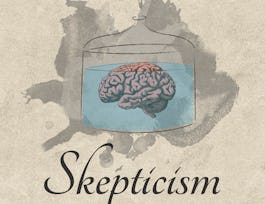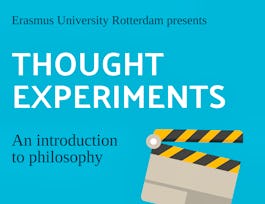Relativism is an ancient philosophical doctrine which has recurred time and again in the history of philosophy. It has also transcended the boundaries of that discipline, for it has shaped much of the methodology in anthropology and sociology, as well as in critical theory and literary studies. While often advocated for its supposed tolerance of differences, relativism has profound consequences for how we think of reality, for the possibility of knowledge, both in the factual and in the moral domain, and may engender the practice of double standard.


Relativism
Taught in English
Some content may not be translated
8,226 already enrolled
(37 reviews)
Details to know

Add to your LinkedIn profile
4 quizzes
See how employees at top companies are mastering in-demand skills


Earn a career certificate
Add this credential to your LinkedIn profile, resume, or CV
Share it on social media and in your performance review

There are 4 modules in this course
Welcome to Module 1: Introduction to Relativism. In this module, we will explore how current issues in public debate (climate change denial, fake news, vaccine skepticism, religious and political extremism) trade on relativism, and how relativism may be thought of as being a source of good by promoting pluralism and tolerance. We will begin by defining Relativism, and review the various forms, including faultless disagreement, relativism of difference, and local vs. global Relativism.
What's included
2 videos1 reading1 quiz1 discussion prompt
Welcome to Module 2: Alethic Relativism. This week we will explore the structure of alethic relativism in Protagoras’ philosophy, examine the structure of contemporary alethic relativism, and identify the main objections to both forms of alethic relativism.
What's included
1 video1 reading1 quiz1 discussion prompt
Welcome to Module 3: Epistemic Relativism. In this module we will explore the structure of epistemic relativism and identify how epistemic relativism can be used to explain important events in the history of science and crucial discoveries in anthropology. We will also review the main objections to epistemic relativism and examine how the data provided by the history of science and anthropology could be understood without appealing to epistemic relativism.
What's included
1 video1 reading1 quiz1 discussion prompt
Welcome to Module 4: Moral Relativism. In this module we will explore the structure and framework of ethical relativism and review alethic relativism and relativism of distance as applied to ethics. We will identify the main objections to these forms of ethical relativism and recognize the difficulty of formulating a coherent relativist proposal. Finally, course participants are asked to apply their understanding of one of the forms of relativism and create a presentation to share their personal perspective.
What's included
1 video2 readings1 quiz1 peer review1 discussion prompt
Instructor

Offered by
Recommended if you're interested in Philosophy

University of California, Irvine

Erasmus University Rotterdam

Universidad de Palermo

University of Pennsylvania
Why people choose Coursera for their career




Learner reviews
Showing 3 of 37
37 reviews
- 5 stars
56.75%
- 4 stars
24.32%
- 3 stars
8.10%
- 2 stars
5.40%
- 1 star
5.40%
Reviewed on Sep 6, 2020

Open new doors with Coursera Plus
Unlimited access to 7,000+ world-class courses, hands-on projects, and job-ready certificate programs - all included in your subscription
Advance your career with an online degree
Earn a degree from world-class universities - 100% online
Join over 3,400 global companies that choose Coursera for Business
Upskill your employees to excel in the digital economy
Frequently asked questions
Access to lectures and assignments depends on your type of enrollment. If you take a course in audit mode, you will be able to see most course materials for free. To access graded assignments and to earn a Certificate, you will need to purchase the Certificate experience, during or after your audit. If you don't see the audit option:
The course may not offer an audit option. You can try a Free Trial instead, or apply for Financial Aid.
The course may offer 'Full Course, No Certificate' instead. This option lets you see all course materials, submit required assessments, and get a final grade. This also means that you will not be able to purchase a Certificate experience.
When you purchase a Certificate you get access to all course materials, including graded assignments. Upon completing the course, your electronic Certificate will be added to your Accomplishments page - from there, you can print your Certificate or add it to your LinkedIn profile. If you only want to read and view the course content, you can audit the course for free.
You will be eligible for a full refund until two weeks after your payment date, or (for courses that have just launched) until two weeks after the first session of the course begins, whichever is later. You cannot receive a refund once you’ve earned a Course Certificate, even if you complete the course within the two-week refund period. See our full refund policy.


